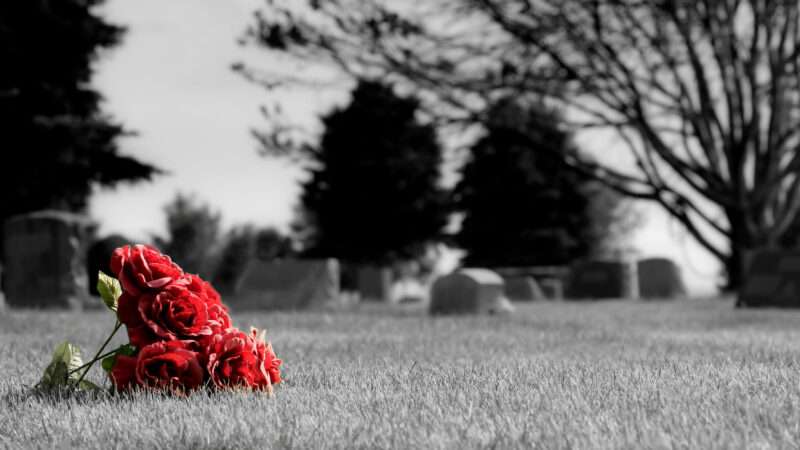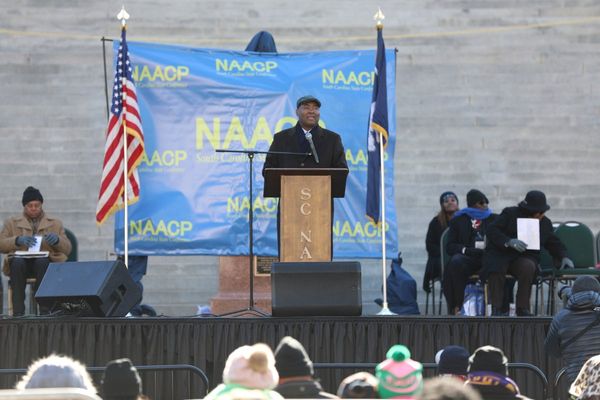
A Michigan couple wanted to start a "green" cemetery, a place where the dead can be buried in a more natural and environmentally friendly manner. Local officials didn't want that—so they banned all cemeteries within the township.
Instead of pumping bodies full of preservatives like formaldehyde and burying them in wood-and-metal caskets or concrete vaults, green burials involve placing the deceased directly into the ground to decompose naturally into the soil, often in biodegradable wood caskets or cotton shrouds.
Peter Quakenbush tells Reason that he learned about the process while working in wildlife management. "I've always been interested in biology and nature, and I have a few degrees in biology," he says. The idea of preserving a natural green space while simultaneously providing people an environmentally friendly place to be buried—which would, in turn, provide natural nourishment for the forest—struck him as "a really wonderful kind of win-win combo."
Peter and his wife Annica set about to make the dream a reality. After years of searching, they found a 20-acre parcel of undeveloped land within an hour of Grand Rapids that would make a suitable site. There they planned to establish the West Michigan Burial Forest, developing the land using criteria set out by the Green Burial Council, a private organization that certifies green cemeteries. As of December 2023, the council had certified 333 green cemeteries in the U.S. and Canada.
Specifically, the Quakenbushes wanted to make their site a conservation burial ground, in which they would obtain a conservation easement—limiting what the land could ever be used for—and partner with a conservation organization so that the land could be maintained in perpetuity. Their 20-acre parcel would remain a natural forest, otherwise undisturbed, and their burials would use no unnatural chemicals or non-biodegradable materials. Instead of headstones, they would use natural markers, such as trees or rocks native to the area.
In February 2022, they reached out to zoning officials in nearby Brooks Township to see what they would need to do next. According to the Quakenbushes, zoning official Joseph Selzer gave them a list of paperwork they would need in order to qualify for a land use permit. They started drawing up a site plan and reached out to land conservancies who could partner with them on an easement.
They also contacted the district health department, which reviewed their paperwork and visited the site in July to take a soil sample before approving the site in February 2023.
So it came as a shock to the Quakenbushes when, in June 2023, the Brooks Township Board unanimously passed the Township Cemetery Ordinance. Under the ordinance, "cemeteries are expressly prohibited and banned within Brooks Township." The statute even defined cemetery to include "any conventional cemetery, green cemetery, conservation cemetery, burial forest or forest cemetery."
The Quakenbushes are suing the township, seeking an injunction preventing officials from enforcing the ordinance, which they say deprives them of due process in violation of the Michigan Constitution. They are represented by the Institute for Justice (I.J.), a public interest law firm.
Shortly after the Quakenbushes reached out to local zoning officials, the township's legal counsel emailed Selzer to recommend "that new private cemeteries not be allowed within the Township except under certain very limited circumstances."
Alowing "new small or informal private cemeteries on private properties would likely create significant problems throughout the Township and potential property purchasers in the future," wrote Brooks Township attorney Cliff Bloom.
Specifically, Bloom worried that "at some time in the future (whether in a few decades or the distance [sic] future), the family members of the deceased individuals will no longer own the parcel involved," at which point its status as a burial ground "would devalue the property and make it unmarketable or difficult to sell."
"My response to that is, what does it matter? It's not your property," says I.J. attorney Renée Flaherty, who is representing the Quakenbushes.
It's also a nonissue, says Peter. "That's where the relationship with the land conservancy, and the certification, comes in," he says. To be certified as a conservation burial ground, one must "operate in conjunction with a government agency or a nonprofit conservation organization that has legally binding responsibility for perpetual monitoring and enforcement of the easement," according to the Green Burial Council.
And even in the absence of such an agreement, state laws exist to address the concern. Under Michigan law, private cemeteries must register with the state cemetery commissioner. And before a cemetery can sell its first burial plot, "an irrevocable endowment and perpetual care trust fund shall be created by the deposit of at least $50,000.00 into the fund," and "each month, not less than 15% of all proceeds received" shall be deposited into the endowment fund.
The Cemetery Ordinance purports to "protect the public health, safety and general welfare," but Bloom's email indicates that officials are concerned less about how the Quakenbushes use the property than what may happen if one day the they are no longer able to maintain it.
"It will be cared for in perpetuity as a forest, first by Peter and Annica and then whatever organization they partner with," says Flaherty. "But the whole point is to preserve it as a forest—that is what Peter and Annica want to do. They want this land to remain a wild forest forever, and they should have the right to make that decision about property that they own. If the town wants to develop it later, like, sorry for them. It's not their property."
The post Michigan Township Bans All Cemeteries To Prevent Family from Starting One appeared first on Reason.com.







